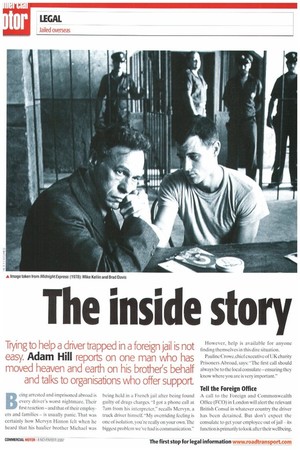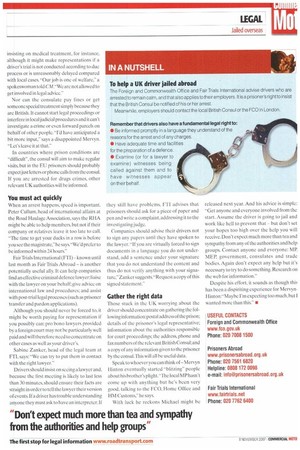The inside story
Page 42

Page 43

If you've noticed an error in this article please click here to report it so we can fix it.
Trying to help a driver trapped in a foreign jail is not
easy. Adam Hill reports on one man who has
moved heaven and earth on his brother's behalf and talks to organisations who offer support.
Being arrested and imprisoned abroad is every driver's worst nightmare. Their first reaction— and that of their employers and families — is usually panic. That was certainly how Mervyn Hinton felt when he heard that his haulier brother Michael was being held in a French jail after being found guilty of drugs charges. "I got a phone call at 7am from his interpreter," recalls Mervyn, a truck driver himself. "My overriding feeling is one of isolation, you're really on your own.The biggest problem we've had is communication." However, help is available for anyone finding themselves in this dire situation.
Pauline Crowe, chief executive of UK charity Prisoners Abroad, says: "The first call should always be to the local consulate— ensuring they know where you are is very important."
Tell the Foreign Office
A call to the Foreign and Commonwealth Office (FC0) in London will alert the relevant British Consul in whatever country the driver has been detained. But don't expect the consulate to get your employee out of jail — its function is primarily to look after their wellbeing. insisting on medical treatment, for instance, although it might make representations if a driver's trial is not conducted according to due process or is unreasonably delayed compared with local cases. "Our job is one of welfare," a spokeswoman told CM."We are not allowed to get involved in legal advice."
Nor can the consulate pay fines or get someone special treatment simply because they are British. It cannot start legal proceedings or interfere in local judicial procedures and it can't investigate a crime or even forward parcels on behalf of other people. "I'd have anticipated a bit more input," says a disappointed Mervyn. "Let's leave it at that."
In countries where prison conditions are "difficult", the consul will aim to make regular visits, but in the EU prisoners should probably expect just letters or phone calls from the consul. If you are arrested for drugs crimes, other relevant UK authorities will be informed.
You must act quickly
When an arrest happens, speed is important. Peter Cullum, head of international affairs at the Road Haulage Association, says the RHA might be able to help members, but not if their company or relatives leave it too late to call. "The time to get your ducks in a row is before you see the magistrate," he says."Well prefer to be informed within 24 hours."
Fair Trials International (FTI) —known until last month as Fair Trials Abroad — is another potentially useful ally. It can help companies find an effective criminal defence lawyer; liaise with the lawyer on your behalf; give advice on international law and procedures; and assist with post-trial legal processes (such as prisoner transfer and pardon applications).
Although you should never be forced to, it might be worth paying for representation if you possibly can: pro bono lawyers provided by a foreign court may not be particularly well paid and will therefore need to concentrate on other cases as well as your driver's.
Sabine Zankcr, head of the legal team at FT1, says: "We can try to put them in contact with the right lawyer."
Drivers should insist on seeing a lawyer and, because the first meeting is likely to last less than 30 minutes, should ensure their facts are straight in order to tell the lawyer their version of events. If a driver has trouble understanding anyone they must ask to have an interpreter. If they still have problems, FPI advises that prisoners should ask for a piece of paper and pen and write a complaint, addressing it to the investigating judge.
Companies should advise their drivers not to sign any papers until they have spoken to the lawyer. "If you are virtually forced to sign documents in a language you do not understand, add a sentence under your signature that you do not understand the content and thus do not verify anything with your signature,"Zanker suggests."Requesl a copy of this signed statement."
Gather the right data
Those stuck in the UK worrying about the driver should concentrate on gathering the following information: postal address of the prison; details of the prisoner's legal representative; information about the authorities responsible for court proceedings; the address, phone and fax numbers of the relevant British Consul; and a copy of any information given to the prisoner by the consul.This will all be useful data.
Speak to whoever you can think of—Mervyn Hinton eventually started "blitzing" people about hi s brother's plight."The local MP hasn't come up with anything but he's been very good, talking to the FCO, Home Office and HM Customs," he says.
With luck he reckons Michael might he released next year. And his advice is simple: "Get anyone and everyone involved from the start. Assume the driver is going to jail and work like hell to prevent that — but don't set your hopes too high over the help you will receive. Don't expect much more than tea and sympathy from any of the authorities and help groups. Contact anyone and everyone: MP. MEP, government, consulates and trade bodies. Again don't expect any help but it's necessary to try to do something. Research on the web for information."
Despite his effort, it sounds as though this has been a dispiriting experience for MervynHinton:"Maybe I'm expecting too much, hut I wanted more than this." •






















































































































































































